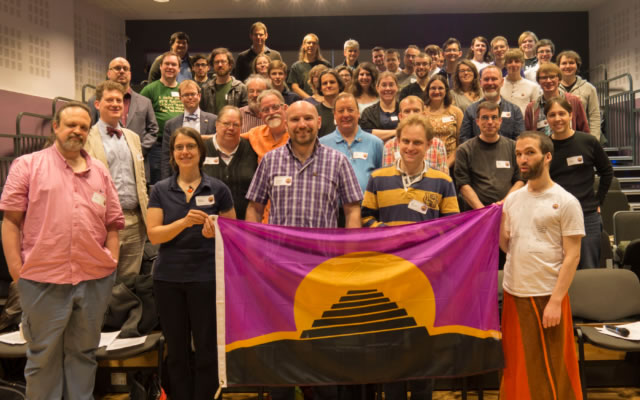Here some nice examples of pictures made from words that illustrates interesting idioms in a variety of languages. I really like the way they’re done.









Idioms that get lost in translation, courtesy of Expedia.com
Here some nice examples of pictures made from words that illustrates interesting idioms in a variety of languages. I really like the way they’re done.









Idioms that get lost in translation, courtesy of Expedia.com
Last week I went to the circus. It wasn’t a traditional circus in a big top with animals and clowns, but the wonderful Pirates of the Carabina with their Relentless Unstoppable Human Machine in the theatre in the local arts centre.
I also saw the film The Greatest Showman, a film based loosely on the life of P.T. Barnum.
I enjoyed both very much, and thought I’d write about the word circus, and related words.
In English a circus can be:
1. A traveling company of performers that may include acrobats, clowns, trained animals, and other novelty acts, that gives shows usually in a circular tent.
2. A round open space in a town or city where multiple streets meet.
3. A spectacle; a noisy fuss
If you’ve ever wondered why Oxford Circus in London is so named, when there are usually no of clowns, acrobats or other circusy things there, now you know.
In ancient Roman a circus was an open air stadium for chariot racing, horse racing and performances. Most Roman circuses were oblong rather than round.
The word circus comes from the Latin circus (ring, circle), from the Ancient Greek κίρκος (kírkos – circle, ring, racecourse), from the Proto-Indo-European *sker / *ker (to turn, to bend), which is also the root of the English words ring and rink. [source].
The word juggle comes the Middle English jogeler (juggler), and and from the Old French jogler, jongler (to have fun with someone), from the Latin joculāri (to jest; joke). It is also related to the Old French jangler (to regale; entertain; have fun; trifle with; tease; mess around; gossip; boast; meddle), from the Frankish *jangalōn (to chit-chat with; gossip).
[source].
The word clown is possibly related to the Icelandic klunni (klutz) or the Old Frisian klönne (klutz) [source].
The word big top, for a large tent, was first used in 1825 by J. Purdy Brown’s itinerating show in Virginia [source]. Why that particularly term was used is uncertain.
The photo is one of me juggling clubs that I took last year. I’ve been juggling and doing other circusy things for over 30 years, and have considered joining a circus, or becoming a circus skills trainer. At the moment I go to the Bangor University Circus Society every week to practise my circus skills, and to teach others. More photos are available on Flickr.
Are any of you into juggling or other circus skills?
Does anybody have a name for the current decade?
I heard someone calling it the nowies on TV recently. Are there other names for it?
Also, did you have a name for the first decade of the 21st century?
It was called the naughties / noughties by some.
According to a thread on Quora, suggested names for the current decade include:
Names for the first decade of this century include:
Are there nicknames for these decades in other languages?
English is a bit of a mongrel. It is basically a West Germanic language, but contains words from many other languages, especially French, Latin, Greek and Old Norse. In fact, only about 26% of English vocabulary is Germanic, 29% is from French, 29% from Latin, 6% from Greek, and the rest from many other languages [source].
When English borrows words from other languages, which it does all the time, most people see the process as a positive one that expands and enriches English vocabulary.
There will always be some who object to the adoption of certain words, however, within a few generations, or even a few years, those words can become fully integrated in the language, and people might not even be aware they were borrowed in the first place.
Japanese is also open and accepting of foreign words, mainly from Chinese and English. These loan words are changed to fit Japanese phonetics, and some are shortened and combined to make original new words, such as リモコン (rimokon) = remote control, and オープンカー (ōpun-kā) = convertible car.
Borrowing between languages is common around the world where languages come into contact. The borrowing often flows from large languages, like English or Spanish, into smaller languages, such as regional, minority and endangered languages.
When smaller languages borrow from bigger languages, some believe the smaller languages suffer in the process, becoming corrupted, impoverished, polluted, etc. Such sentiments are much less common when talking about borrowing from smaller languages into bigger languages.
There seems to be a double standard here.
Borrowing will happen, even though language regulators, such as the Académie française, might object and try to stop it. Languages change and influence one another. They can borrow many words from other languages without losing their identity, and without breaking down into incomprehensible grunts.
What do you think?
Do languages benefit from borrowing?
Yesterday I learnt an interesting French word – huissier [ɥi.sje], which means baliff, usher, process server, catchpole or tipstaff.
It is an abbreviation of huissier de justice, an officer of the court who serves process and notices, seizes and auctions off property, and executes garnishments, levies, and evictions.
It comes from the Vulgar Latin *ustiārius, from ostiārius (porter, doorman), from ostium (door, entrance, estuary).
Related terms include:
You may be wondering, what’s a catchpole or tipstaff? I certainly am. I know a family called Catchpole, but don’t know what the word means.
Catchpole is an obsolete word for “A taxman, one who gathers taxes; A sheriff’s officer, usually one who arrests debtors.” It comes from the Old French chacepol (one who chases fowls).
Tipstaff is “A ceremonial staff, with a metal tip, carried by a constable or bailiff etc as a sign of office; An officer, of a court etc. who carries such a staff.”
Sources: Reverso, Wiktionary
| français | English | Cymraeg |
|---|---|---|
| le radeau | raft | rafft |
| flotter sur un radeau | to raft | rafftio |
| la tortue (de mer) | (sea) turtle | crwban y môr; môr-grwban |
| huissier; agent de poursuite | bailiff | beili |
| le porche | porch | porth; cyntedd; portsh |
| le comprimé; le cachet | pill | pilsen; pelen |
| le dessert | dessert | melysfwyd; danteithfwyd; pwdin |
| le désert | desert | anial; diffaith; anghyfannedd |
| parfumé; plaisant; agréable | fragrant | persawr; pêr; perarolgus; melys |
| la chambre d’enfants; la crèche; la garderie | nursery | meithrinfal; magwrfa; cylch meithrin |
One way to say remember in Swedish is komma ihåg, which literally means “to come to mind”. It also means to recall; to recollect; to retain, or to bear in mind.
Komma [ˈkɔmːa] means ‘to come, arrive, move nearer’. It comes from the Old Norse koma (to come), from the Proto-Germanic *kwemaną (to come), from the Proto-Indo-European *gʷem- (to step).
ihåg [ihoːg] means ‘to (one’s) mind’. håg means ‘mind, mindset, temper, inclination’, and comes from the Old Swedish hogher, from Proto-Germanic *hugiz (mind; thought; sense; understanding), which is also the root of the English words high, how, Hugh and Hubert.
Related words include:
Other words for remember include:
Are these words for remember used in different contexts?
Sources: bab.la, Wiktionary
A few years ago I went to the 6th Language Creation Conference in Horsham, near London.

I am in the second row, second from the right (next to David J. Peterson)
At the time I had created a few alphabets but didn’t plan to create any languages. However, since the conference I have been dabbling with ideas for a conlang.
The language I’m working on is called Laala. It’s an isolating language, like Chinese, so there are no grammatical inflections. The word order is VSO (Verb, Subject Object), like Celtic languages. Basic words are mostly one syllable. In two syllable words the vowel in the first syllable (if there is one) can be long, e.g. teete (everything) – te = thing. Some consonants can be long as well, such as mm (to like, good, fine, happy), and mmm (to love, adore, joy).
Some words are omomatopeic (they sound something like the thing or action they represent), e.g. zz = sleep; ff = wind, air; and hh = cold.
I try to keep the basic vocabulary to a minimum, like Toki Pona, so many words have multiple meanings, and words are based on simple roots. For example, ss = fire, light; ka = big; ki = small, nu = time, nuu = long time. So sska = sun, sski = moon, sskanu = day, sskinu = night, and nuuka = year.
My aims for this language are to have fun playing with it, to learn more about how languages work, and to create something that sounds interesting when spoken and sung. I don’t expect anybody else to learn Laala, and it certainly isn’t intended as a international auxiliary language like Esperanto.
I have put together a page of phrases in Laala. The phrases may change as the language develops.
In the past I’ve only posted details of conlangs on Omniglot if they are written with an original and interesting alphabet or other writing system. I’m now thinking of creating a separate section of the site, or even a separate site for conlangs and constructed scripts. What do you think?
Have you created any languages that you’d like to see on Ominglot?
Have you ever wondered what you call the long stringy white bits you remove from bananas before eating them?
I haven’t thought about this before, but today I discovered that they are called phloem bundles. They are structures that transport nutrients from the leaves to other parts of plants.
In trees they are the innermost layer of bark, and the word phloem [ˈfləʊ.em / ˈfloʊ.em] comes from the Greek word φλοιός (phloios), which means bark. The word bast is also used as an alternative for phloem.
Source: Huffington Post, Wikipedia, Cambridge Dictionary

An interesting Swedish I learnt recently is snigelhus, which means shell, or literally “snail house”. Snigel is a snail or slug, and hus is house, case or residence.
The word snigel comes from the Old Norse snigill (snail), from the Proto-Germanic *snagila (snail), from the Proto-Indo-European *sneg- (to crawl, creep; creeping thing), which is also the root of the English words snail and snake.
Some related words include:
Another name for snail is snigel med skal (snail with shell), and another name for slug is snigel utan skal (snail without shell).
So it seems that skal is another word for shell. It also means coat, paring, rind, jacket or peel. A snail’s shell is not snigels snigelhus but snigelskal.
Other Swedish words for shell include:
Sources: bab.la, Wiktionary, Online Etymology Dictionary, and Linguee